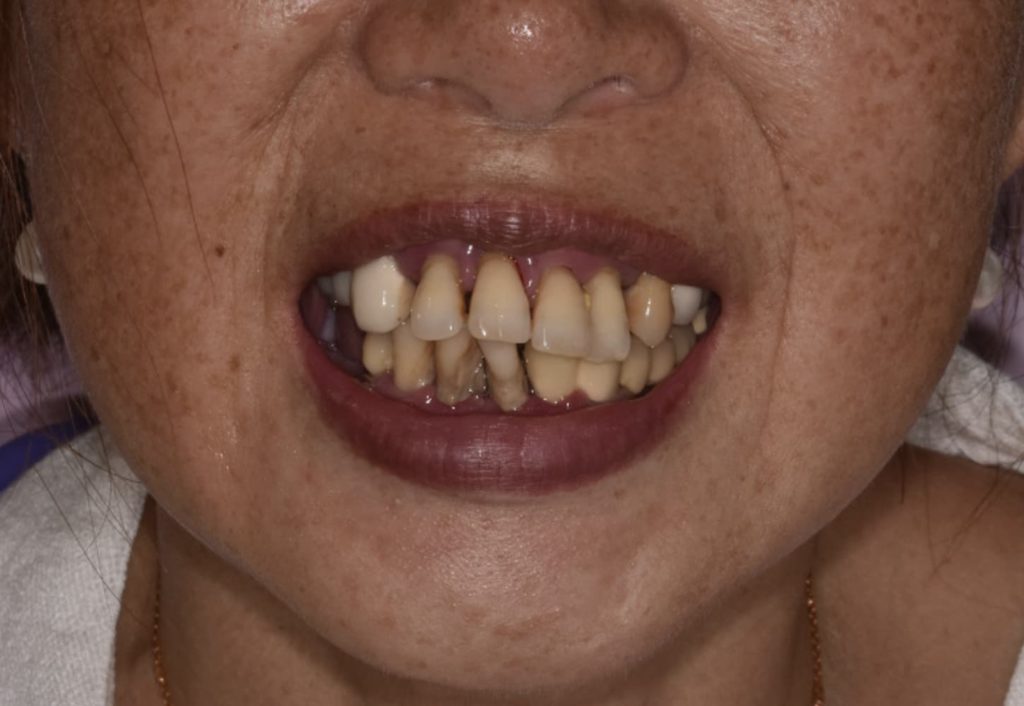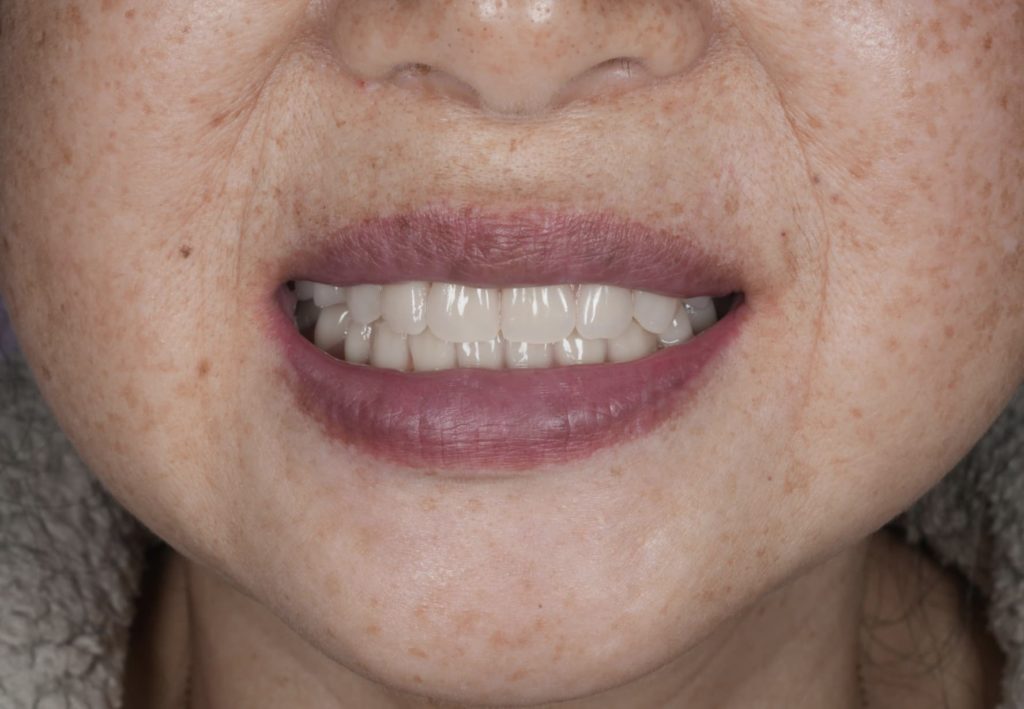Dental implants
Dental implants
Implants are small titanium metal screws (perfectly biocompatible) that are placed in the bone and play the same role as the root of a tooth.
Dental implantology at CHD
Dental implants offer a durable and aesthetic solution for replacing missing teeth, restoring normal chewing and a natural smile. They blend in perfectly with existing teeth, preserving the jawbone and avoiding receding gums and shifting adjacent teeth.
Discover this treatment in video


Visit our library of
Rates
| Implant + crown | ~3100.- |
Exact quotation before processing.
*You can also choose to pay in installments.
Fair & transparent prices
We strive to maintain unbeatable value for money: reasonable prices, which have not changed since 2016, for quality of care that has earned us numerous awards:



Advice
Once an implant has been placed and the corresponding crown made, you will be referred to the hygienist so that we can work together to determine which oral hygiene method is best suited to you.
EVERYTHING you always wanted to know about dental implants in one video:
Given the development of technologies and materials in dentistry, implants are now the best solution for replacing missing teeth.
Dr Arnaud, Dentist, Clinique CHD Meyrin, Geneva and Yverdon – Nord Vaudois.
Next appointment
Your next appointment (recall) is scheduled as part of the personalised follow-up offered by CHD. This is based on your lifestyle, the quality of your saliva and other parameters, to ensure that your oral health remains at an optimum level. And you don’t have to worry about it any more, we’ll take care of reminding you: text message, letter, email, it’s your choice!
Our dental clinics
Find out more about dental implants
A dental implant is a small, cylindrical, metal screw that is inserted into the bone and plays the same role as the root of a tooth. It is made of biocompatible titanium. This means that a dental implant is perfectly well tolerated by the body and is unlikely to trigger any allergic or rejection reactions.
Thanks to a phenomenon known as “osseointegration”, a dental implant can bond to the bone in which it is placed. Osseointegration is a natural process that takes between 6 and 8 weeks. It is more commonly referred to as healing. During this period, a very strong bond is created between the dental implant and the jawbone, thanks to the formation of new bone tissue on the surface of the implant. Once osseointegrated, the dental implant can withstand the forces of chewing perfectly.
Implants are therefore artificial roots that serve as anchors for a dental crown that will be permanently fixed to them (screwed or bonded). Dental bridges and full or partial dentures can also be attached.
If a tooth and its root are lost, there are 2 alternatives to a dental implant:
– A bridge: a dental bridge is a fixed device that replaces one or more missing teeth by resting on the 2 adjacent teeth, which requires each of these teeth to be drilled;
– A removable partial denture: a removable partial denture fills the gap in the dentition caused by the absence of one or more teeth.
There are many different brands of implant available on the market, and the quality of each is completely different. Whether in terms of the type of titanium, resistance to wear and fracture, or the strength of the connections between the screw and the crown, the statistics can vary from 1 to 10 between these brands. Obviously, the price of a dental implant is directly related to its quality.
We believe that patients should always be informed by their dentist before any implant surgery. Whether at CHD Geneva, CHD Meyrin, CHD Lausanne or CHD Yverdon, we have chosen to use Swiss Straumann implants, the world leader in implantology.
As part of our ongoing efforts to make care more accessible, we offer these dental implants from CHF 2,900 (implant + crown). If several implants are required, we apply a sliding scale of prices. In all cases, an exact estimate is drawn up before treatment, based on the patient’s specific situation, and in particular on the amount of bone and gum tissue available.
A dental implant is fitted in several stages:
1st stage: The implantology consultation
An initial consultation with the surgeon is required to carry out an in-depth study of the patient’s clinical situation and to plan the operation. This appointment is used to define the time required for the operation and the way in which the implant will be placed. Pre-medication can also be arranged. In a large number of cases, we use 3D implant planning software and carry out a simulation in order to place the implant in the best possible position.
If necessary, an appointment with the hygienist may be scheduled in order to reduce the bacterial load: as with any surgery on the human body, however minor, it is vital to work in a clean and healthy environment.
2thstage: Placing the dental implant
Placing a dental implant is a surgical operation performed under local anaesthetic. It is a painless procedure, the duration of which varies according to the clinical situation of each patient. More specifically, an operation to place 1 or 2 implants is generally completed in 60 to 75 minutes. More complex procedures such as the all on 4, all on 6 or all on 8 protocols may require more time and more detailed planning.
3rd stage: The healing period
During this period, the bone will reform around the implant. This is known as osseointegration. This stage lasts 6 to 8 weeks.
In some cases, it is possible to place the implant and a temporary crown at the same time (“immediate loading”). This method is most often indicated in the case of an anterior tooth (central incisor, lateral incisor or canine), as it allows the gum tissue to be shaped and the crown to emerge in the gum in an extremely natural way. If this is not possible, a temporary removable appliance is made to maintain minimum aesthetics and function while the implant heals.
4th stage: Fitting the dental crown
After the healing period, the crown is permanently fixed to the dental implant using an abutment, either cemented or screwed.
Fitting an implant may cause some discomfort and moderate pain. However, it is a procedure that is considered to be very minor by all patients. In fact, they report post-operative symptoms that are comparable or even less than those of a dental extraction.
The healing time required to ensure perfect stability of the dental implant is approximately 6 to 8 weeks. In special cases (specific anatomy or the patient’s particular medication), this time may be extended to ensure osseointegration of the implant.
For the first 48 hours, we strongly recommend that you eat only cool, liquid foods. Thereafter and during the healing phase, only soft foods will be allowed. The temporary prosthesis should not be used to chew hard or crunchy foods. Finally, it is also vital to keep the wound clean by brushing the area with a soft manual toothbrush.
It is also important to eat foods rich in protein and essential nutrients needed for a good recovery.
Swelling may occur after a dental implant has been fitted: this is localised swelling that is completely normal and will disappear on its own after 72 hours.
You can help reduce the swelling by applying the ice pack you are given for 15 minutes every hour:
Dental implants are normally permanent devices that can last the lifetime of the patient. However, regular check-ups are essential to check the condition of the implants and prevent any complications. These appointments are used to carry out important maintenance work such as scaling, and to detect and treat dental implants in the event of infection.
Maintenance and care have a direct impact on the lifespan of dental implants. Oral and dental hygiene must be appropriate and impeccable to ensure that the operation lasts. It is therefore very important to follow the personalised advice of your dental hygienist to the letter, and to attend regular check-ups.